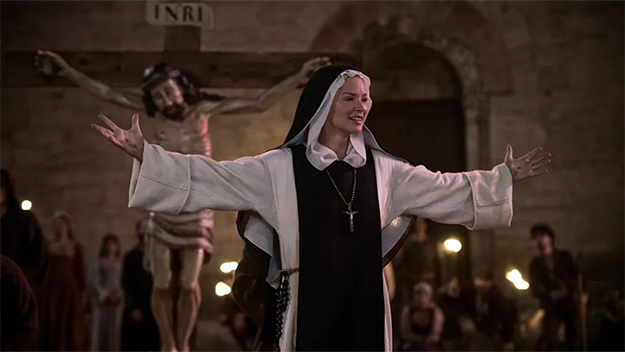Heavens!
This article, part of our coverage of NYFF59, appeared in the September 29 edition of The Film Comment Letter, our free weekly newsletter featuring original film criticism and writing. Sign up for the Letter here.

Benedetta (Paul Verhoeven, 2021)
You may have heard about the Virgin Mary dildo. The ascetic world of a 17th-century convent doesn’t allow for much in the way of props, but Paul Verhoeven’s Benedetta makes abundant use of what’s available. “We don’t always understand the instruments God uses,” the Abbess (Charlotte Rampling) intones gravely. Some of the younger nuns have some pretty inventive ideas, all the same.
Among them are the Benedetta (Virginie Efira), a forthright daughter of a wealthy family, and Bartolomea (Daphne Patakia), a peasant who runs to the convent to escape her abusive father. Bartolomea is accepted there as a gift to Benedetta, whose father now has to pay not one but two dowries for these brides of Christ. It does not take long for dark-eyed Bartolomea to return the favor. After some accidental breast-grazing and a good, old-fashioned choir-practice goosing, the two tumble giddily onto a cot. Bartolomea reveals her present: a wooden statue of the Virgin Mary, cherished by Benedetta since she was a girl, with its lower half whittled into a smooth, oblong shape. Benedetta is thrilled, and, during its employment, the little head of Mary bobs along, dare I say, approvingly.
However raunchy, Benedetta never condemns its subject. It treats the real-life story of Benedetta Carlini—the only nun on record to have a detailed account of sapphic exploits—with sincerity, even reverence. This trial is depicted in the film’s second act, when the sneering and duplicitous Nuncio (Lambert Wilson) arrives from Florence to judge whether Benedetta’s manifestations of the stigmata are authentic or heretical. Until then the convent has been undisturbed by Church intrigue and the plague otherwise ravaging Europe. It is a haven from the patriarchal world, home to a group of misfit women—true believers but also former prostitutes, unmarriageable daughters, and women who, like Bartolomea, refused the sexual servitude demanded by their male relatives. Inside its walls is a near-paradise where, despite the rules strictly governing matters of the flesh, young nuns in loose linen garments frolic without shame. A few farts on a latrine become an occasion to marvel at the body. Even the Nuncio, by far the worst of the lot, is promised admission to heaven.
Most films about Christianity are organized around a test of faith, either that of embattled believers (The Passion of Joan of Arc, Breaking the Waves, Silence, The Diary of a Country Priest), doubters questioning their calling (Father Sergius,Winter Light, The Exorcist), or ordinary folk confronted with the inexplicable (Ordet; Léon Morin, Priest; Nostalghia; Sergeant York). Benedetta has some of this, as when characters furnish “proof” that Benedetta staged her mystical wounds, but it breezily dispenses with the tortured hand-wringing of so many other art-house miracles. To suspect the divine mysteries that attend Benedetta misses the point of how much fun she is having when she envisions Christ as a medieval action hero or when she delightedly peeks beneath his loincloth. When she gasps that the Lord replaced her heart with his own, and implores Bartolomea to feel her bare chest, you can sense Verhoeven delighting in her zeal and audacity. Blasphemy doesn’t really describe it, because the film’s nose-thumbing, while ostensibly pointed at the Church, extends to all manners of stifled creativity, including, most immediately, the blandness of contemporary filmmaking.
As Benedetta, Efira is completely self-possessed. The real-life Benedetta apparently was censured for her pride; Efira, meanwhile, is too stunning and strange to argue against. Beset by ecstatic visions, she spends much of the time collapsed on the floor, her loose gown attractively rumpled and her hair always beachy. Whenever anyone doubts her, she channels the deep and commanding voice of Jesus to scold them. This always gets people’s attention. At other times she matter-of-factly reports what he has told her, or what he hasn’t: “Jesus didn’t mention you,” she says to a rival nun. Benedetta, or her divine interlocutors, are not above being petty. Patakia, meanwhile, is ferocious as Bartolomea, who seems barely aware that she is at a convent. She is narrowly fixated on Benedetta, charging at her from across the room at one point. Rampling, as the scheming and cynical Abbess, watches the giggling couple with half-raised eyebrows. She might be having the best time of all.
The delight the cast members evidently take in their roles is mirrored in an early scene where the nuns reenact the Assumption of Mary during a mass. Benedetta plays Mary, of course. She lies serenely on an altar, attended by nuns dressed in brown robes and fake beards. As her limp body is taken to heaven (lifted by a sturdy rope), she has a vision of a hunky Jesus, surrounded by sheep, calling for her. She runs to him, crying “I’m coming!” The parishioners, meanwhile, only see Benedetta’s feet kicking furiously, her joy irrepressible.
Benedetta is an oddly buoyant film. Bathed in natural light streaming in from the abbey windows, miracles bloom, as the Abbess archly observes, “like mushrooms.” During the trial, the Nuncio’s entourage is baffled by Benedetta’s lesbianism, a concept that didn’t exist for 17th-century clerics. Short of a miracle, they protest, a woman cannot love another woman. To this we can rejoice: Here, too, the impossible can occur!
Genevieve Yue is assistant professor of culture and media and director of the Screen Studies program at Eugene Lang College, the New School. She is a member of the Board of Trustees of the Flaherty, and author of Girl Head: Feminism and Film Materiality (Fordham University Press, 2020).







